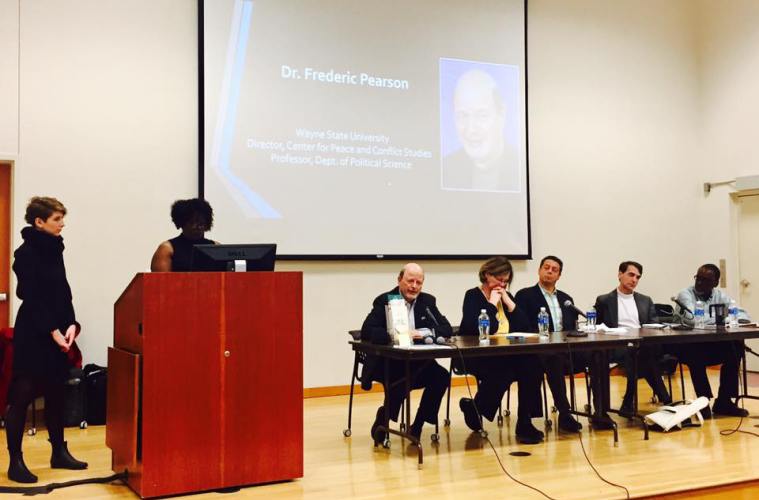Deconstructing white supremacy? Asks WSU community members to ask important questions
To deconstruct means to take a large concept or idea and break it into its component parts. On Feb. 20, 2017, Wayne State University's Center for Peace and Conflict Studies and Damon J. Keith Center for Civil Rights, and the Detroit Equity Action Lab (DEAL), co-sponsored a panel focused on the deconstruction of white supremacy. More than 45 people attended the panel, including WSU students, faculty and the public.
 Five Wayne State faculty members participated in the panel, with each panelist allotted 10 minutes to deconstruct different facets of power and white supremacy. The event was organized by the Center for Peace and Conflict Studies' Community Dispute Resolution Specialist Barbara L. Jones.
Five Wayne State faculty members participated in the panel, with each panelist allotted 10 minutes to deconstruct different facets of power and white supremacy. The event was organized by the Center for Peace and Conflict Studies' Community Dispute Resolution Specialist Barbara L. Jones.
"When we talk about race, the discussions always break down," Jones said. "It's not about 'white guilt,' it's not about 'white fragility,' it's not about 'white decline' it is about acknowledging that you do have these privileges and writing a different story with regards to your privileges."
Frederic Pearson, director of the peace and conflict studies department and professor of political science at Wayne State, started the panel.
"If we can get beyond fear and have some focused discussions by bringing people to each other's neighborhoods and seeing each other as people and beginning to have civil conversations, I think we can start to get beyond some of this fear."
Ronald Brown, professor of political science at WSU, focused his presentation on the institutional mechanism of citizenship and religious activism in regards to white supremacy. Panelist Howard Lupovitch, director of the Cohn-Haddow Center for Judaic Studies and associate professor of history at WSU, examined the racialization of the Jewish population throughout American history.
Brad Roth, professor and director of undergraduate studies for the Wayne State Department of Political Science, inspected John Locke's Second Treatise of Government and made connections to institutionalized oppression. Finally, Liette Gidlow, associate professor of history at WSU, focused on explaining the many different forms and facets of white supremacy that exist beyond the Ku Klux Klan.
"Not everyone wants to talk about race, and it makes a lot of people uncomfortable," said undergraduate political science student Ifrah Mahmood. "There are a lot of white people in the government who don't want to acknowledge that we're not living in a post-racial society, even though many people want to paint it like that. We are not living in a post-racial society. I hope we never do."
The Center for Peace and Conflict Studies at WSU hopes to organize a series of community discussions and panels between different communities in metro Detroit as a part of their "Beyond Fear and Hate" campaign. You can watch the entire of the "Deconstructing White Supremacy?" panel: Destructing White Supremacy?
To learn more about events and opportunities to participate, please contact Barbara L. Jones at barbaraljones@wayne.edu.
Written by CLAS communications associate Christiana Castillo